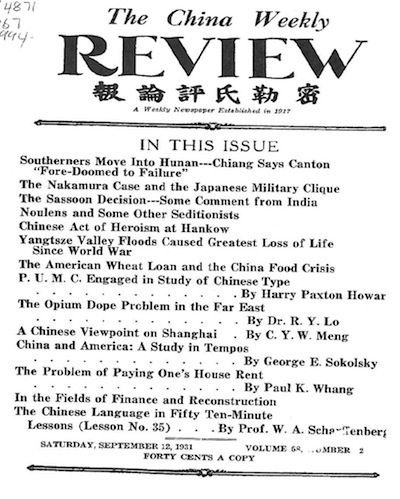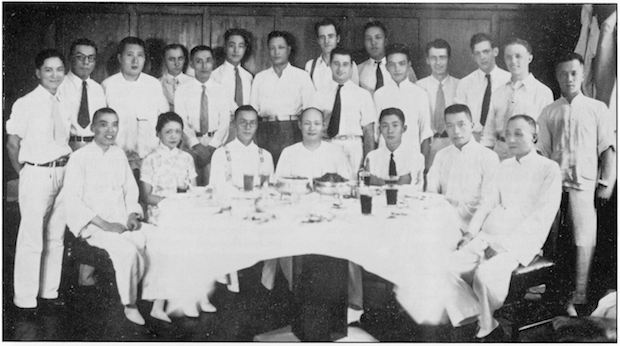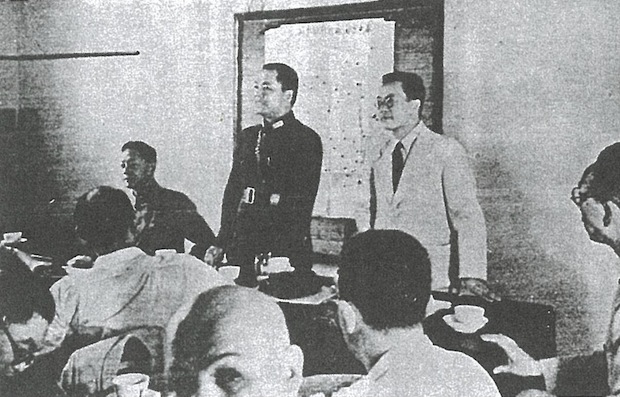|
|||||||||||
|
NEW SCHOLARSHIPTo Win the West Chinese English-Language Propaganda, 1928–1941Shuge Wei 魏舒歌 College of Asia and the Pacific The Australian National University
The following essay provides an overview of a recently completed doctoral dissertation. For a discussion of some of the issues raised by the author in the contemporary context, see The China Story project at www.thechinastory.org.—The Editor
Since the end of the Mao era, China has actively sought to re-engage with the world. Whereas opinions on how to portray this economic giant but ideological heretic remain divided, the Chinese government is proactively expanding its efforts to increase its "soft power" overseas and establish both reputation and legitimacy. Using soft power to cultivate a favourable image among foreigners is not, however, an entirely new strategy for China. Back in the Republican era (1911-1949), the Chinese government successfully developed a foreign propaganda apparatus to win the hearts and minds of Western audiences over to its cause.  Fig.1 Cover of the China Weekly Review, 12 September 1931 When Chiang Kai-shek established the Nanjing government in 1928, China was a weak country still in many respects subjected to the collective control of foreign powers. Japan's invasion in the 1930s not only challenged the territorial sovereignty of the nation but also the balance of power in East Asia. Without a strong military and economic power to withstand Japanese pressure, the Guomindang government sought to win the support of Western powers in its resistance against Japan by influencing international public opinion. Yet the lack of a news infrastructure as well as the anti-imperial tradition of the Guomindang significantly complicated the Nanjing government's efforts to conduct propaganda for its cause effectively. How could a weak nation overcome those difficulties and positively affect international public opinion? The English-language Treaty Port press—a product of the imperialism age of the Western trading powers (for more on this, see Rudolf Wagner's essay in this issue of China Heritage Quarterly)—provided a channel for China to pursue propaganda in its efforts to resist imperialist encroachment. Operated in the foreign settlements and concessions, the press offered a convenient medium for China to communicate with metropolitan audiences and influence international opinion and diplomatic circles. As witnesses of Chinese affairs, Treaty Port journalists were highly regarded as credible sources by audiences back in their home countries. Although the newly established Nanjing government was determined to obtain control of the Treaty Port media in order to circumvent its deficiency in news infrastructure, the extraterritorial system kept preventing it from exercising effective control. Extraterritorial privileges, discussed elsewhere in this issue, created a complex media environment in the Treaty Ports, where conventional national boundaries did not apply and transnational registration, editorship, ownership and subsidies became common practice in the press. Moreover, Treaty Port papers often took a stance different from the metropolitan press. Each paper had its own constituency, representing different interest groups. The most distinguished British-operated newspaper, the North China Daily News, for example, strongly advocated imperial interests in China, while the US-operated journal, The China Weekly Review, supported Chinese independence. The complexity of the media environment created further difficulties for the government. To harness the power and authority of the English-language Treaty Port press, the government attempted to limit the extraterritorial privileges of foreign journalists through the control of the postal system and with the threat of deportation. It also sought to restore cable control and subject Treaty Port papers to the central government's registration system. The Nanjing officials' lack of a personal network with foreign journalists and editors also limited their influence over the English-language press. While links between the Nanjing government and the English-language press were tenuous, the connections between the press and Chinese elites in the Treaty Ports were tight. To enhance local connections with foreign journalists, Chiang Kai-shek approached the bilingual Chinese elites to develop the country's propaganda network, in particular he availed upon the services of the US-trained journalist Hollington Tong, a man who had established his own news network during his editorship of US-registered periodicals, the China Weekly Review and the China Press. Meanwhile, the Guomindang leftists led by Wang Jingwei were also keen to extend their influence in the English-language media by operating the People's Tribune.  Fig.2 China Press staff party, probably Chinese New Year, 1934. Seated (left to right): first not identified; next Au Huna Tong, Women's Page Editor, James Shen, reporter, T.B. Chang, owner of the paper, Wu Kya-tang, reporter, last two not identified. Back row (left): David Liu and E.T. Tsu, both in accounting, next not identified, next Tillman Durdin, Managing Editor, Hawthorne Cheng, Chinese translator, next not identified, next Hollington K. Tong, Chief Editorial Writer and General Manager, next Malcolm Rosholt, Assistant Night Editor, K.S. Chang, Sports Editor, in front of Chang is Max Chaircheck, Assistant Sports Editor, next not identified, next James Hammond, City Editor, Alex Buchman, Feature Writer, LaSelle Gilman, Feature Writer and Zoong Zee, receptionist and No. 1 office boy.
With Chiang's support, Tong centralized the foreign propaganda resources of the government and from 1937 established a new propaganda system. He overhauled propaganda policy and expanded the scope of official propaganda activities based on his personal news networks in the Treaty Ports. Despite the general distrust of foreign correspondents among Guomindang officials, Tong's approach involved co-opting foreign journalists rather than controlling them. Tong adopted a relatively liberal censorship policy that strongly encouraged Western journalists to wire their eye-witness reports overseas. It was due to these efforts that China's foreign propaganda was considerably improved during the Wuhan period. Although the move of the government to Chongqing in southwest China forced the fledging propaganda department to abandon its already scarce resources in the central and lower Yangtze River areas, the system continued to play an important role in breaking through the information blockade imposed by Japanese forces on Chongqing. The department managed to make the voice of the Chiang Kai-shek government heard abroad despite constant Japanese bombardment. Tong also sought to undermine the pro-Japanese Wang Jingwei government's propaganda effort in Shanghai. However, during the Chongqing period, the Guomindang resumed its strict surveillance of foreign correspondents in its attempts to limit contact with the Communists. The cooperation between the foreign propaganda department and the intelligence office raised concern among foreign journalists regarding their privacy. Indeed, the period between 1928 and 1941 witnessed two marked trends: a growing sympathy for China's anti-Japanese cause in the English-language press and the development of China's foreign propaganda system. The two processes were closely connected. Although it is improper to claim that the latter was the sole cause of the former, since other elements, such as the conflict of interests between Western Powers and Japan as well as Japanese atrocities in China, also contributed to the change of opinion, it is undeniable that China's continuous propaganda efforts in the English-language press successfully intensified the existing tensions between Anglo-American countries and Japan and contributed significantly to the transformation of international public opinion.  Fig.3 Press conference of the International Department, Hollington K.Tong seated
Drawing on a wide range of archival sources in mainland China, Taiwan and Australia, my study provides an alternative interpretation to the perceived passivity of China's foreign propaganda apparatus during the Sino-Japanese crisis. While the majority of scholars have focused on the development of hard power in examining China's nation-building during the inter-war period, this research argues that English-language propaganda, a form of soft power, was an important means for China to restore and defend national sovereignty in the absence of a strong military and economic capacity at the time. The development of the foreign propaganda system was a transnational and trans-social process, shaped in part by the Treaty Port press, itself a legacy of imperial domination. My research combines the examination of the government's news policies, personal networks between Guomindang officials and treaty-port journalists, and discourse analysis of reports on Sino-Japanese conflicts in key English-language Treaty Port and metropolitan papers. It traces the formation of propaganda institutions, their relationship with other official or non-official organization or newspapers, news policies, the evolution of a centralized structure, and the mechanisms by which personnel were allocated within the system. |